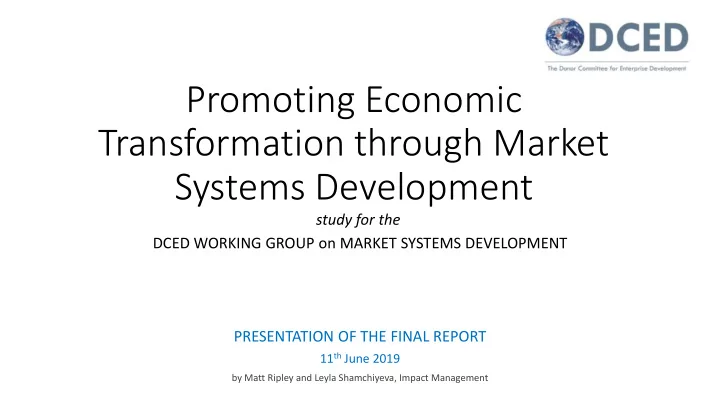

Promoting Economic Transformation through Market Systems Development study for the DCED WORKING GROUP on MARKET SYSTEMS DEVELOPMENT PRESENTATION OF THE FINAL REPORT 11 th June 2019 by Matt Ripley and Leyla Shamchiyeva, Impact Management
Overview • Q1: What does the current evidence suggest about the role that donor-funded market systems development (MSD) programming plays in promoting both structural and intra-sectoral economic transformation? • Q2: How could the MSD approach be modified or adapted, including through combinations with other forms of support, in order to better promote economic transformation? • Literature review plus 26 telephone interviews with Working Group members • Focus on Sub-Saharan Africa, and aspects of inclusion • Final report 31 st May – this presentation follows report outline
1. Drivers of Economic Transformation and the Role of MSD
Market Systems Development • An approach to development that MSD and Economic Transformation: seeks to address the root causes of why markets can fail to meet the Alignment of focus: connecting needs of people living in poverty • It aims to catalyze systemic changes, macro, meso, micro Alignment of objectives: sustained which are changes in the way core markets, supporting functions and growth and poverty reduction rules perform that ultimately Alignment of timeframe: long- improves the participation of target term, but short-term pressures groups (such as people living in Alignment of principles: active poverty, youth, marginalized groups) within the market system. interventions, adaptive, contextual Source: BEAM Exchange
How does MSD currently contribute to ET? Level ET focus MSD focus Where illustrative MSD programmes Macro Enabling Functions and ENABLE, Nigeria: Improving conditions rules at the public-private dialogue and economic level of policy FSD Africa: Financial Sector fundamentals and economy development Meso Sector- Sector- MDF, Pakistan: Improved skills specific specific for local leather manufacturing conditions functions and M4C, Bangladesh: Improved and targeted rules services for geographically interventions vulnerable farmers Micro Determinants Business BIF, Myanmar: Modern of growth and models and management practices in productivity practices; garment manufacturers at the firm target groups Katalyst, Bangladesh: Smaller level seed pack sizes for farmers
2. Donor and development agency perspectives on using MSD to promote economic transformation
Using MSD for economic transformation Strength of MSD is its pragmatism “The mechanisms for doing “Market systems is the art of the possible” [economic transformation] are well known in principle if difficult to “Industrial policy often leads to academic implement in practice.” recommendations, MSD can help put those into Timmer and Akkus, 2008 practice” “[The] MSD approach can be instrumental to promote the concept of mixed economy where public and private sectors can work together in a sustainable way with the view to achieve economic transformation.”
Conclusion Currently : MSD programmes are contributing to some aspects of within-sector transformation, particularly value chain development and agricultural productivity. This will continue to be important for inclusive transformation in Africa, but there is an opportunity for MSD to play a number of other roles in supporting different types of transformational change a) Seed. MSD programmes can support disruptive innovations that seek to kick-start or contribute to the early growth of new, more modern economic activities and sectors. b) Scale. MSD can play a play a role in supporting sectors that are already rapidly emerging, such as ‘industries without smokestacks’ c) Support. MSD programmes can seek to diversify rural livelihoods (off-farm employment) whilst continuing to raise on-farm productivity, in order to manage the ‘downside risks’ of economic transformation
3. How MSD could be modified or adapted to better promote economic transformation
1) Adapt how sector selection criteria are applied in practice in order to align with structural change objectives 2) Engage more in the ‘rules of the game’ and address political economy constraints to inclusive ET 3) Greater clarity on systemic change in the context of structural transformation 4) Use a broader range of facilitation tools 5) Deploy a more strategic approach to building portfolio within and between programmes
4. Recommendations, focusing on practical implications and guidance for donors
1. Set clear expectations for how MSD programmes should ‘work politically’ • Avoid; Align; About or Absorb? 2. Ensure the ‘enabling conditions’ are in place for MSD programmes to support economic transformation . • Align impact expectations with timeframe and risk appetite; longer-term programming; joined up programming across PSD and other disciplines; mechanisms to explore risk-sharing between donors and implementers 3. Conduct in-depth research and commission specific case studies on the impact of market systems development on economic transformation processes • Country case studies to contextualise systemic change; the political economy of economic transformation; specific examples of how MSD programmes facilitated a transition to high-value added activities and increased competition
Synergies and complementarities with BER study
Synergies • Targeting BER and MSD for ET • MSD report suggests a focus on sectors with structural change potential, as part of an approach to balanced portfolio construction • BER report calls for ‘smart’ and coordinated action (between donors and governments) to target specific sectors
Complementarities • BER study mentions tools to assess productivity potential of sectors, which can be integrated into MSD sector selection (‘opportunity’ criteria) • MSD report calls for engaging more in the ‘rules of the game’, which will take programmes into BE topics • BER report recommends general theories of change for ET; which can be built on by MSD programmes (with an inclusion lens) • MSD report highlights a “black box” understanding of ET; BER report calls for a common definition - which would help shared understanding • BER report calls for incorporating ET into strategies; this would help frame opportunities for MSD to be used strategically to support ET
Implications for donors • Definitions • ToC and ‘impact thesis’? • Learning on BE & MSD for ET – systemic change case studies of successful transformation, where MSD was used to improve BE
Recommend
More recommend